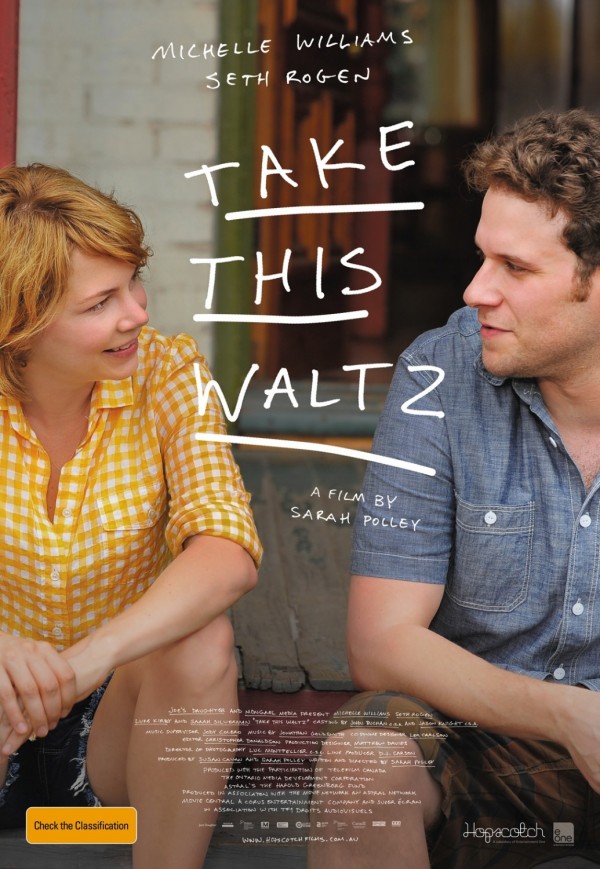TAKE THIS WALTZ (2011, directed by Sarah Polley, 116 minutes, Canada)
 BY DAN BUSKIRK FILM CRITIC It has the generic trappings of a mainstream romantic comedy, but actress Sarah Polley’s second film as a writer/director exists in a plane beyond your typical Jennifer Aniston/Matthew McConaughey RomCom. Continuing the deeply-felt understanding of character she exhibited in her debut, the 2006 Alzheimer drama Away From Her, Polley further establishes herself as a young director to be reckoned with. Polley has been a particularly subtle actress since the ripe old age of nine, and the list of directors she has worked with sounds like a one-of-a-kind director’s master class, with names like Gilliam, Cronenberg, Egoyan, Bigelow, and Winterbottom among them. She has learned well. While Take This Waltz is small in scale — a love triangle set over the course of a single summer — there is a dazzling, sustained intelligence in every detail that makes you think that Polley is able to achieve exactly what she wishes as a filmmaker.
BY DAN BUSKIRK FILM CRITIC It has the generic trappings of a mainstream romantic comedy, but actress Sarah Polley’s second film as a writer/director exists in a plane beyond your typical Jennifer Aniston/Matthew McConaughey RomCom. Continuing the deeply-felt understanding of character she exhibited in her debut, the 2006 Alzheimer drama Away From Her, Polley further establishes herself as a young director to be reckoned with. Polley has been a particularly subtle actress since the ripe old age of nine, and the list of directors she has worked with sounds like a one-of-a-kind director’s master class, with names like Gilliam, Cronenberg, Egoyan, Bigelow, and Winterbottom among them. She has learned well. While Take This Waltz is small in scale — a love triangle set over the course of a single summer — there is a dazzling, sustained intelligence in every detail that makes you think that Polley is able to achieve exactly what she wishes as a filmmaker.
And as you would expect, Polley is great with actors. Here she takes an over-exposed pair, Michelle Williams and Seth Rogen, and gets some of the most memorable work of their career. A friend opined that they’d already seen too much of Seth Rogen but if you find his comedy irritating, that won’t work against your enjoyment of this film. As the husband Lou and odd-man-out in this love triangle, all his attempts to win over his wife with jokes and pranks make him seem more like an annoying little brother than a husband. It’s a brave role for Rogen, one that turns his considerable charms as a comedian against him, playing a guy whose default position is always humor when the occasion calls for seriousness.
But it is Michelle Williams as his wife Margot, a wanna-be writer living in Toronto, that the film revolves around. Williams specializes in a certain uneasy vulnerability, and here she gets to plumb those depths in a thoughtful drama about infidelity. We would guess Margot was happily married until she got a little flirty with Daniel (Luke Kirby) , whom she meets on a flight back to the city. Turns out the handsome artist and rickshaw driver lives just across the street from Margot and Lou’s home (shades of Truffaut’s The Woman Next Door) and a long, hot summer gets hotter as the newfound neighbors find excuses to cross paths.
The summer passes by with the tension building as Daniel and Margot’s flirting grows more and more daring. Innuendo grows more suggestive and then Margot goes home to Lou, who is always experimenting with new chicken recipes for a book he’s writing. Polley’s literate script is full of these little allusions, comparing matrimony to finding a thousand ways to cook a chicken, and for the most part she sets these tiny metaphors into motion with great subtlety.
Polley’s script also gives the couple’s extended family some of those very specific edges that resonate universally. Among them is Lou’s sister Geraldine, in a dramatic turn by Sarah Silverman. Geraldine is a recovering addict who vacillates constantly between bitterness and neediness while dispensing the occasional unvarnished truth abut the lives among them. The film has received some early press for a brief scene where Sarah Silverman and Michelle Williams are among those bathing in a gym shower room, discussing their men problems as seniors across the shower room listen in. The scene is really about the ephemeral quality of life but it is also dares us to see movie stars as mere people, as no one looks their sexiest while leaning on a wall scrubbing their feet. It’s undeniably memorable but just one of many intimate moments that feel more out of our own lives than borrowed off the screen.
It’s the actors who summon these moments but Polley the director renders them richer with a dreamy visual style that mostly succeeds in walking the lines between natural beauty and stark realism. Watching Margot finally letting loose on a thrill ride reminded me of Lynne Ramsey’s reveries with Samantha Morton in Movern Callar. It’s a restrained stylishness that doesn’t need to remind you of the person behind the camera, a functional egolessness. As Lou, Daniel, and Margot between them dance their dance, Polley gives their predicament as boost in scale by making Toronto seem as unique and colorful as it usually is colorless. It’s love as it is in the city with its details only a tad too romantic.
What ultimately sets Take This Waltz away from lesser romances is that it sets up an impossible situation and refuses to end it gracefully. Lou is too sincere to dump and Daniel is too good to resist, Margot’s indecision seems real because she is truly absent any great choices. She makes choices anyway, in a wise and satisfying climax that shows Margot to be like a lot of us, making all the truly important decisions one move too late.

